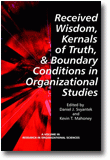
Received Wisdom, Kernels of Truth, and Boundary
Conditions in Organizational Studies
Edited by:
Daniel J. Svyantek, Auburn University
Kevin T. Mahoney, South Dakota State University
A volume in the series: Research in Organizational Science. Editor(s): Daniel J. Svyantek, Auburn University.
Published 2013
This volume of the Research in Organizational Sciences is entitled “Received Wisdom, Kernels of Truth, and Boundary Conditions in Organizational Studies”. Received wisdom is knowledge imparted to people by others and is based on authority and tenacity as sources of human knowledge. Authority refers to the acceptance of knowledge as truth because of the position and credibility of the knowledge source. Tenacity refers to the continued presentation of a particular bit of information by a source until this bit of information is accepted as true by receivers. The problem for organizational studies, however, is that this received wisdom often becomes unquestioned assumptions which guide interpretation of the world and decisions made about the world. Received wisdom, therefore, may lead to organizational practices which provide little or no benefit to the organization and, potentially, negative organizational effects, because this received wisdom is no longer valid. The 14 papers in this volume all, in some way, strive to question received wisdom and present alternatives which expand our understanding of organizational behavior in some way. The chapters in this volume each strive to present new ways of understanding organizational constructs, and in so doing reveal how received wisdom has often led to confirmation bias in organizational science. The knowledge that some perceived truths are actually the products of received wisdom and do not stand up to close scrutiny shakes up things within research areas previously thought settled allowing new perspectives on organizational science to emerge.
CONTENTS
Received Wisdom, Kernels of Truth, and Boundary Conditions in Organizational Conditions in Organizational Studies: Developing Organizational Science Through Questions, Kevin T. Mahoney and Daniel J. Svyantek. Fear and Loathing at Work: A Savage Journey to the Heart of Received Wisdom on Generational Difference, Lisa A Steelman and Mary Margaret Sudduth. The Case of Mondays: Examining Workplace Rumors About Stress, Larissa K. Barber, Brandon W. Smit, and Mindy K. Shoss. Do Management Scholars Mistakenly Believe in the Capacity of Self-Efficacy, Jeffrey B. Vancouver, Justin M. Weinhardt, Michael A. Warren, Amanda R. Cameron, Justin D. Purl, Anastasia L. Milakovic, and Xiaofei Li. Abusive Supervision and the High-Impact Employee: Hurting Our Most Valuable Resource, Jeremy Mackey, Rachel Kane, Pamela Perrewe, and Vickie Gallagher. Supervisor Power × Subordinate Political Skill Interaction on Work Relationship Quality: Alternative Interaction Forms as a Function of Dyadic Influence Dynamics, Rachel E. Kane, Arthur D. Martinez, Darren C. Treadway, and Gerald R. Ferris. Managing Organizational Deviance: Focusing on Causes, Not Symptoms, Melissa B. Gutworth, Dana M. Morton, and Jason J. Dahling. Against All Evidence: General and Specific Ability in Human Resource Management, Malcolm James Ree, Mark S. Teachout, and Thomas R. Carretta. The Conceptual Versus Empirical Distinctiveness of Work Performance Constructs: The Impact of Work Performance Items, Nichelle C. Carpenter and Winfred Arthur Jr. Keeping Women in Their Place: The Joint Influence of Target Gender and Interpersonal Hierarchy Expectations on Contextual Performance Requirements, Dan S. Chiaburu, Heather C. Kissack, and Marianne Schmid Mast. From Role Conflict to Evaluation Discordance: How do Conflicting Performance Evaluations Affect Risk Taking in Multiple Audience Contexts, Edward Bishop Smith. Rethinking the Validity of Interviews for Employment Decision Making: Implications of Recent Developments in Meta-Analysis, In-Sue Oh, Bennett E. Postlethwaite, and Frank L. Schmidt. Meta-Analysis as Received Wisdom in the Organizational Sciences: Is It Meeting Its Intended Objectives? John E. Baur, B. Parker Ellen III, Philip S. DeOrtentiis, M. Ronald Buckley, and Gerald R. Ferris. The Commonality of Perceptual Error in the Evaluation of Interunit Interdependence: Implications for Dysfunctional Coordination, J. Daniel Sherman. Received Wisdom, Groupthink, and Organizational Ethical Culture, Ronald R. Sims and William I. Sauser, Jr. About the Authors.
-
Paperback9781623961893
Web price: $62.04 (Reg. 72.99)
-
Hardcover9781623961909
Web price: $89.24 (Reg. 104.99)
- eBook9781623961916

- BUS042000 - BUSINESS & ECONOMICS: Management Science
- BUS041000 - BUSINESS & ECONOMICS: Management
- BUS047000 - BUSINESS & ECONOMICS: Negotiating
-
 A Closer Examination of Applicant Faking Behavior
A Closer Examination of Applicant Faking Behavior
-
 Crisis, Chaos and Organizations
The Coronavirus and Lessons for Organizational Theory
Crisis, Chaos and Organizations
The Coronavirus and Lessons for Organizational Theory
-
 Emerging Themes in International Management of Human Resources
Emerging Themes in International Management of Human Resources
-
 Organizational Processes and Received Wisdom
Organizational Processes and Received Wisdom
-
 Organizations Behaving Badly
Destructive Behavior and Corrective Responses
Organizations Behaving Badly
Destructive Behavior and Corrective Responses
-
 Refining Familiar Constructs
Alternative Views in OB, HR, and I/O
Refining Familiar Constructs
Alternative Views in OB, HR, and I/O
-
 Sports and Understanding Organizations
Sports and Understanding Organizations

